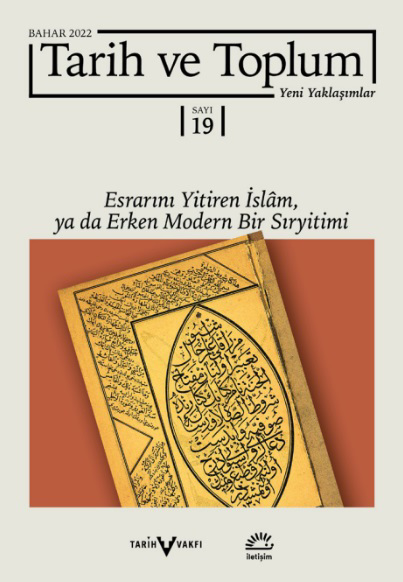Islam without secrets, or an early modern demystification: The early modern history of the modern ilmihal in the footsteps of Birgivi, Akhisarlı, and Kadızade
BAKİ TEZCAN
This article aims at historicizing Islam. With that goal in mind, on the one hand, it draws attention to the fact that one comes across to rationalization of religion, which is one of the processes Max Weber had referred to with his concept of disenchantment, in the lived experience of Islam in the Ottoman Empire during the early modern period. On the other hand, it underlines the textual nature of this rationalization. In order to contextualize these concepts, this study also touches upon the Sufi tradition of the Middle Ages and argues that Islam was enchanted (or mystified) during this era and disenchanted (or demystified) during the early modern period. These developments are discussed through certain works of Gazzâlî (d. 1111), İznikî (d. 1418), Birgili (d. 1573), Akhisarlı (d. 1632) and Kadızade (d. 1635) and the differences between the first Turkish ilmihal (catechism) of the Ottoman realm and the modern ilmihal are underlined.
Keywords: Gazzâlî (d. 1111), Kutbüddin İznikî (d. 1418), Birgili Mehmed (d.
1573), Akhisarlı Ahmed Rûmî (d. 1632), Kadızade Mehmed (d. 1635), Max Weber, disenchantment, ilmihal (catechism), rationalization of religion, Islam
*
The provincial state of labor in the Ottoman Empire: Reactions of workers, officers, and peasants in Beirut (1890-1914)
HAMZA ERDEM
This study claims that the worker movements in the Ottoman Empire did not arise only in the central and industrial cities. In the empire, labor movements took place in the provinces as well as in the central cities. At the same time, this study determines that not only workers but also officers and peasants have reactions. For this purpose, in the study, Beirut province was taken as an example and focused on the reactions of workers, officers and peasants within the province.
Keywords: Ottoman Empire, Beirut, Workers, Officers, Peasants
*
Business Historiography in Turkey: A critical approach and the possibilities for a new historiography
AKANSEL YALÇINKAYA
This article’s aim to explores the weakness of the current Turkish business historiography and make a contribution to the possibilities of business history writing in Turkey. The field of business history is a newly developing field in Turkey with limited experience. A critical look at the business history literature in Turkey reveals that this literature has some problems, primarily ontological and methodological. It is observed that the field of business history in Turkey is ontologically stuck between the economic history and the universal business history disciplines. It is seen that the field of business history in Turkey lacks an interdisciplinarity that reflects the historical and economic diversity of Turkey. The studies that will be included in the scope of business history are mostly devoid of a critical quality, especially company monographs, and do not have a critical stance on the phenomenon they are dealing with. It is seen that the field of business history in Turkey is based on individual examples and facts and is far from a comparative historiography approach that will highlight economic and historical diversity. It can also be mentioned that the history from below approach in historiography, cannot penetrate the business history studies in Turkey, and in this case, marginal stakeholders of business organizations cannot be adequately represented in business historiography. From this point of view, in order to institutionalize a business history field
with a high contribution potential in the local context, a holistic and new business historiography approach that takes into account the above-mentioned issues should be adopted. In this study, it is aimed to discuss the possibilities of such a business historiography and to present the structure of a new business historiography by bringing together historiographic literature and business historiography, based on the local historiographic literature, by presenting possible alternatives.
Keywords: Business history, Historiography, Business historiography

